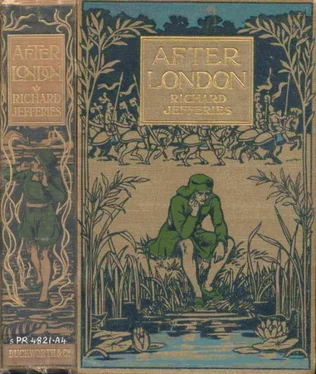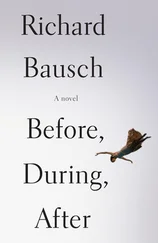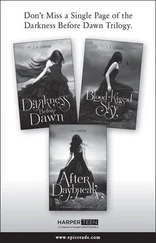Richard Jefferies - After London
Здесь есть возможность читать онлайн «Richard Jefferies - After London» весь текст электронной книги совершенно бесплатно (целиком полную версию без сокращений). В некоторых случаях можно слушать аудио, скачать через торрент в формате fb2 и присутствует краткое содержание. Город: London, Год выпуска: 1905, Издательство: Duckworth & Co., Жанр: sf_postapocalyptic, на английском языке. Описание произведения, (предисловие) а так же отзывы посетителей доступны на портале библиотеки ЛибКат.
- Название:After London
- Автор:
- Издательство:Duckworth & Co.
- Жанр:
- Год:1905
- Город:London
- ISBN:нет данных
- Рейтинг книги:4 / 5. Голосов: 1
-
Избранное:Добавить в избранное
- Отзывы:
-
Ваша оценка:
- 80
- 1
- 2
- 3
- 4
- 5
After London: краткое содержание, описание и аннотация
Предлагаем к чтению аннотацию, описание, краткое содержание или предисловие (зависит от того, что написал сам автор книги «After London»). Если вы не нашли необходимую информацию о книге — напишите в комментариях, мы постараемся отыскать её.
(1885), set in a future in which urban civilization has collapsed after an environmental crisis.” (From
).
This eBook is for the use of anyone anywhere at no cost and with almost no restrictions whatsoever. You may copy it, give it away or re-use it under the terms of the Project Gutenberg License included with this eBook or online at
* * *
After London — читать онлайн бесплатно полную книгу (весь текст) целиком
Ниже представлен текст книги, разбитый по страницам. Система сохранения места последней прочитанной страницы, позволяет с удобством читать онлайн бесплатно книгу «After London», без необходимости каждый раз заново искать на чём Вы остановились. Поставьте закладку, и сможете в любой момент перейти на страницу, на которой закончили чтение.
Интервал:
Закладка:
The gentlemen of the house followed closely, duly marshalled in ranks, and wearing the gayest dress; the leading retainers fully armed, brought up the rear. Immediately upon issuing from the gate of the wall, the procession was met and surrounded by the crowd, carrying large branches of may in bloom, flowers, and green willow boughs. The flowers they flung before him on the ground; the branches they bore with them, chanting old verses in honour of the family. The route was through the town, where the Baron stopped at the door of the Court House, and proclaimed a free pardon to all serfs (who were released within a few minutes) not guilty of the heavier crimes.
Thence he went to the pasture just beyond, carefully mown close and swept for the purpose, where the May-pole stood, wreathed with flowers and green branches. Beneath it he deposited a bag of money for distribution upon a carved butt placed there, the signal that the games were open. Instantly the fiddles began to play, and the feast really commenced. At the inns ale was served out freely (at the Baron’s charge), carts, too, came down from the castle laden with ale and cooked provisions. Wishing them joy, the Baron returned by the same road to the castle, where dinner was already served in the hall and the sheds that had been erected to enlarge the accommodation.
In the afternoon there were foot-races, horse-races, and leaping competitions, and the dances about the May-pole were prolonged far into the night. The second day, early in the morning, the barriers were opened, and trials of skill with the blunt sword, jousting with the blunt lance at the quintain, and wrestling began, and continued almost till sunset. Tournament with sharpened lance or sword, when the combatants fight with risk of serious wounds, can take place only in the presence of the Prince or his deputy. But in these conflicts sufficiently severe blows were given to disable the competitors.
On the third day there was a set battle in the morning between fifteen men on each side, armed with the usual buckler or small shield, and stout single-sticks instead of swords. This combat excited more interest than all the duels that had preceded it; the crowd almost broke down the barriers, and the cheering and cries of encouragement could be heard upon the hills. Thrice the combatants rested from the engagement, and thrice at the trumpet call started again to meet each other, at least those who had sustained the first onslaught.
Blood, indeed, was not shed (for the iron morions saved their skulls), but nearly half of the number required assistance to reach the tents pitched for their use. Then came more feasting, the final dinner prolonged till six in the evening, when the company, constantly rising from their seats, cheered the Baron, and drank to the prosperity of the house. After the horn blew at six, the guests who had come from a distance rapidly dispersed (their horses were already waiting), for they were anxious to pass the fifteen miles of forest before nightfall. Those on foot, and those ladies who had come in covered waggons, stayed till next morning, as they could not travel so speedily. By seven or eight the castle courtyard was comparatively empty, and the Baron, weary from the mere bodily efforts of saying farewell to so many, had flung himself at full length on a couch in the drawing-room.
During the whole of this time Felix had not obtained a single moment with Aurora; her time, when not occupied in attending to the guests, was always claimed by Lord Durand. Felix, after the short-lived but pure pleasure he had enjoyed in watching her upon the grass-grown stage, had endured three days of misery. He was among the crowd, he was in the castle itself, he sat at table with the most honoured visitors, yet he was distinct from all. There was no sympathy between them and him. The games, the dancing, the feasting and laughter, the ceaseless singing and shouting, and jovial jostling, jarred upon him.
The boundless interest the people took in the combats, and especially that of the thirty, seemed to him a strange and inexplicable phenomenon. It did not excite him in the least; he could turn his back upon it without hesitation. He would, indeed, have left the crowd, and spent the day in the forest, or on the hills, but he could not leave Aurora. He must be near her; he must see her, though he was miserable. Now he feared that the last moment would come, and that he should not exchange a word with her.
He could not, with any show of pretext, prolong his stay beyond the sunset; all were already gone, with the exceptions mentioned. It would be against etiquette to remain longer, unless specially invited, and he was not specially invited. Yet he lingered, and lingered. His horse was ready below; the groom, weary of holding the bridle, had thrown it over an iron hook in the yard, and gone about other business. The sun perceptibly declined, and the shadow of the beeches of the forest began to descend the grassy slope. Still he stayed, restlessly moving, now in the dining chamber, now in the hall, now at the foot of the staircase, with an unpleasant feeling that the servants looked at him curiously, and were watching him.
Oliver had gone long since, riding with his new friend Lord Durand; they must by now be half-way through the forest. Forced by the inexorable flight of time, he put his foot upon the staircase to go up to the drawing-room and bid farewell to the Baroness. He ascended it, step by step, as a condemned person goes to his doom. He stayed to look out of the open windows as he went by; anything to excuse delay to himself. He reached the landing at last, and had taken two steps towards the door, when Aurora’s maid, who had been waiting there an hour or more for the opportunity, brushed past him, and whispered, “The Rose arbour.”
Without a word he turned, hastened down the stairs, ran through the castle yard, out at the gate, and, entering the gardens between the wall and the inner stockade, made for the arbour on the terrace where the drama had been enacted. Aurora was not there; but as he looked round, disappointed, she came from the Filbert walk, and, taking his arm, led him to the arbour. They sat down without a word. In a moment she placed her head upon his shoulder; he did not respond. She put her arm (how warm it felt!) about his neck; he yielded stiffly and ungraciously to the pressure; she drew down his head, and kissed him. His lips touched but did not press hers; they met, but did not join. In his sullen and angry silence he would not look. She drew still nearer, and whispered his name.
Then he broke out: he pushed her away; his petty jealousy and injured self-esteem poured out upon her.
“I am not the heir to an earldom,” he said; “I do not ride with a score of gentlemen at my back. They have some wonderful diamonds, have they not— Countess? ”
“Felix!”
“It is no use. Yes, your voice is sweet, I know. But you, all of you, despise me. I am nothing, no one!”
“You are all, everything , to me.”
“You were with—with Durand the whole time.”
“I could not help myself.”
“Not help yourself! Do you think I believe that?”
“Felix, dear. I tell you I could not help myself; I could not, indeed. You do not know all—”
“No, probably not. I do not know the terms of the marriage contract.”
“Felix, there is no such thing. Why, what has come to you? How pale you look! Sit down!” for he had risen.
“I cannot, Aurora, dear; I cannot! Oh, what shall I do? I love you so!”
CHAPTER XI
AURORA
Felix fell on the seat beside her, burying his face in the folds of her dress; he sobbed, not with tears, but choking passion. She held him to her heart as if he had been a child, stroking his hair and kissing it, whispering to him, assuring him that her love was his, that she was unchanged. She told him that it was not her fault. A little while before the feast the Baron had suddenly broken out into a fit of temper, such as she had never seen him indulge in previously; the cause was pressure put upon him by his creditors. Unpleasant truths had escaped him; amongst the rest, his dislike, his positive disapproval of the tacit engagement they had entered into.
Читать дальшеИнтервал:
Закладка:
Похожие книги на «After London»
Представляем Вашему вниманию похожие книги на «After London» списком для выбора. Мы отобрали схожую по названию и смыслу литературу в надежде предоставить читателям больше вариантов отыскать новые, интересные, ещё непрочитанные произведения.
Обсуждение, отзывы о книге «After London» и просто собственные мнения читателей. Оставьте ваши комментарии, напишите, что Вы думаете о произведении, его смысле или главных героях. Укажите что конкретно понравилось, а что нет, и почему Вы так считаете.












